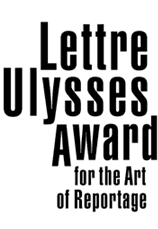
Award Procedure
The winners of the award are decided entirely through an independent jury procedure. The members of the jury are convened by the Lettre International Award Foundation.
The jury consists of independent literary personalities, and embodies a high degree of proficiency and skill, as the majority are profoundly dedicated writers of reportage. Jury members guarantee autonomy and quality through their personal competence, experience and reputation. They are obliged to defend their judgment publicly.
Due to potential conflicts of interest, book publishers, literary agents and state cultural representatives are normally not part of the jury. Exceptions can be made in the case of those who are also themselves writers.
The composition of the jury is partially subject to annual change.
The jury’s task and goal is to select the most outstanding pieces of literary reportage from across the globe. Although it is probable that books will be nominated, extraordinary magazine texts could also be considered.
Languages
To ensure that texts are drawn from the widest possible linguistic and cultural areas, the award is open to all languages. Accordingly, the native languages of the jurors correspond with most of the largest linguistic regions. In 2006, these are the six official languages of the United Nations (English, French, Spanish, Russian, Chinese Mandarin and Arabic); plus Portuguese, Hindi, Turkish, and German, all spoken by more than 100 million people. The ensemble of represented languages may change from year to year.
The jury’s working language is English.
Nominations and evaluations
Each jury-member has the right to two nominations. Only texts published within the preceding two calendar years are eligible. While jury members may ask advice from third parties, they must take responsibility for their decisions.
Jury members present their nominations in the form of written proposals (synopsis and evaluation), justifying their selections.
Jurors select about 30-50 pages of their nominated texts, which are translated into English. All proposals and all translated extracts are then sent to every jury member. These are to be read by all jurors before the first jury meeting.
First jury meeting
The jury discusses the evaluation criteria and their application to the texts in question. The criteria may include: a. importance of the subject, b. originality, c. complexity, d. credibility and authenticity, e. structure, f. language and style, and any other elements deemed to make a work outstanding. Following two days of discussion, the jury decides upon a shortlist.
The chosen texts are then translated into English in their entirety and sent to all jury members.
Second jury meeting
After an in-depth reading of every text, the jurors meet again to reach a final decision.
The Award Ceremony
The winners are first announced at a public ceremony, attended by all jury members, all finalists, and distinguished guests. This event takes place annually in Berlin on the Saturday before the opening of the International Frankfurt Book Fair.
